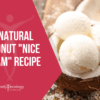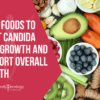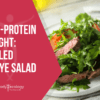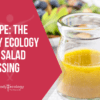Prevent Osteoporosis with This Healthy Source of Calcium
Broccoli and green leafy vegetables are full of nutrients that deeply nourish the body and prevent the development of common chronic diseases.

Who knew that a delicious green veggie like broccoli could provide as much calcium as most dairy products? The best way to enjoy your greens is with butter or ghee to support calcium absorption with vitamin K2.
While many of us take a multivitamin for “insurance” purposes or even to meet our nutritional requirements, nothing beats food as the top source for micronutrients.
This is because food not only gives your body a nutrient, it also gives your body all the equipment needed to process and use it. Eating a full spectrum of whole foods can enhance the bioavailability, uptake, and use of nutrients that are essential to our overall wellbeing.
Certain foods, such as heavily processed and refined foods, might fill your belly and satisfy your taste buds. But these foods will also leave behind nutrient deficiencies.
Besides giving structure to our bones and our teeth, calcium is used for several basic functions in the body. This includes muscle contraction, the release of neurotransmitters, and the contraction of the heart.
Two ways to get the most out of broccoli and other calcium-rich vegetables:
1. Eat your greens with butter.
Butter or ghee from grass-fed cows is rich in a nutrient called vitamin K2. Vitamin K2 is different than the vitamin K that most of us associate with clotting. Vitamin K2, as it turns out, plays an important role in overall health and wellbeing. This includes bone and dental health. Because many of us consume dairy from grain-fed animals, rather than pastured animals, vitamin K2 deficiency is common.
As Dr. Kate Rheaume-Bleue points out in her book Vitamin K2 and the Calcium Paradox, when calcium is in the company of vitamin K2, it knows exactly where to go and what to do. When we do not have enough vitamin K2, calcium tends to get lost. We find deposits of calcium showing up in the arteries, in kidney stones, and contributing to bone spurs. (1)
2. Enjoy cultured vegetables with every meal.
Cultured vegetables are a living and active probiotic. Traditional foods like sauerkraut, pickles, and kimchee can pack a greater probiotic punch than their encapsulated cousins found at most health food stores.
Some of the most calcium-rich foods are broccoli, collards, kale, and arugula. (2) Other good sources for bone-building calcium are cabbage and seaweeds such as kelp and hijiki. A blend of fermented hijiki seaweed, cabbage, and one or two of your favorite spices makes an elegant side dish – while providing calcium, as well as all of the complementary micronutrients that can only be found in whole, minimally processed foods.
What to Remember Most About This Article:
Did you know that the calcium content of broccoli rivals that of dairy? Yet most of us firmly believe that milk is the only way to guarantee strong teeth and bones.
Unfortunately, the standard American diet today leaves many people malnourished and severely lacking in important nutrients. Calcium especially is essential to basic bodily functions like muscle contractions, neurotransmitter release, and the contraction of the heart. Calcium works best in the body with other beneficial nutrients found in whole, calcium-rich foods.
With that in mind, here are two important tips to use to get the most out of calcium-rich veggies in your diet:
- Eat your greens with butter or ghee.
- Eat cultured veggies at every meal.
Product Recommendations:
- [product id=”1″]
REFERENCES:
- Rheaume-Bleue, Kate. Vitamin K2 and the Calcium Paradox: How a Little-Known Vitamin Could Save Your Life. JW & Sons: Canada, 2012.
- http://en.wikipedia.org/wiki/Calcium#Nutrition








